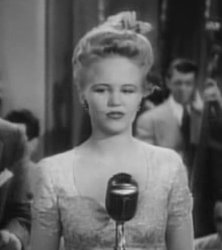| Peggy Lee singles discography | |
|---|---|
 Peggy Lee in the film Stage Door Canteen , 1943. | |
| Singles | 157 |
| Promotional singles | 18 |
| Other charted songs | 8 |
The singles discography of American singer-songwriter Peggy Lee contains 157 singles, 18 promotional singles and eight other charted songs. Lee's first singles were in collaboration with Benny Goodman and His Orchestra, beginning 1941's "Elmer's Tune". Its follow-up, "I Got It Bad (And That Ain't Good)", was Lee's first to make the US chart. She recorded 18 singles with Goodman between 1941 and 1944, including nine that made the US chart. Two of these releases made the top ten, including "Why Don't You Do Right?" (1942). Lee then embarked on a solo career in 1946 and reached the number four position with her debut release, "Waitin' for the Train to Come In". Twenty three of her singles made the US and Australian charts during the 1940s, including the top ten songs "I Don't Know Enough About You" (1946), "It's All Over Now" (1946), "Chi-Baba, Chi-Baba" (1947), "Golden Earrings" (1947), "Riders in the Sky (A Cowboy Legend)" (1949) and "The Old Master Painter" (1949). Additionally, "Mañana (Is Soon Enough for Me)" became Lee's first (and only) single to reach number one on the US chart.
Contents
- Singles
- 1940s
- 1950s
- 1960s
- 1970s–1990s
- Promotional singles
- Other charted songs
- Notes
- References
- External links
The Capitol and Decca labels issued 19 singles between 1950 and 1951, but only two made the US and Australian charts. In collaboration with Gordon Jenkins's orchestra, Lee made the top five of the US chart with 1953's "Lover". Four more singles made the US chart through 1954. This included the US top 20 song, "Just One of Those Things" and a US top 30 collaboration with Bing Crosby called "Watermelon Weather". A majority of Lee's singles did not make any major chart positions until 1956's "Mr. Wonderful". It rose into the US top 20, the Australian top five and became her first single to chart in the UK, climbing to number five. Lee's 1958 single, "Fever", reached commercial success in several countries. It peaked at number eight in the US, number two in Australia, number 11 in Canada and number five in the UK.
Lee's singles continued making the music charts in multiple countries during the 1960s. This began with "Heart" (1960), which reached number 41 in Australia and "Till There Was You" (1961), which peaked at number 30 in the UK. The 1962 single, "I'm a Woman", rose to number 54 in the US and number 79 in Australia. Ten of her songs made the US Adult Contemporary chart during the decade, beginning with "Pass Me By" in 1964. Her 1965 single, "Big Spender", rose to number nine on the chart while 1967's "I Feel It" climbed to number eight. The 1969 release, "Is That All There Is?", became Lee's highest chart entry in more than ten years, peaking at number 11 in the US, number one on the US Adult Contemporary chart, number six in Canada and number one on Canada's Adult Contemporary chart. Singles by Lee continued being released through various labels into the 1970s. Her last to make the US charts was 1974's "Let's Love" and a re-release of "Fever" in 1992 was her last entry in the UK.